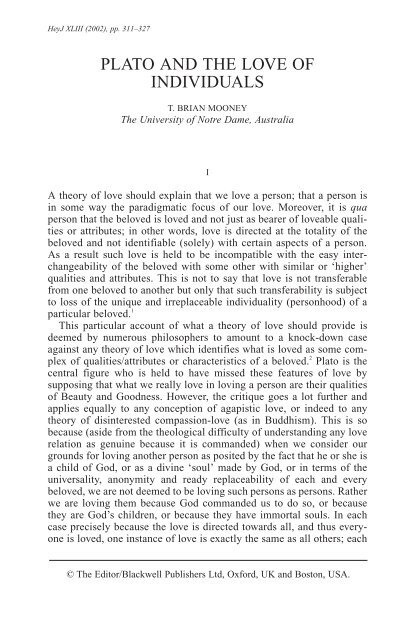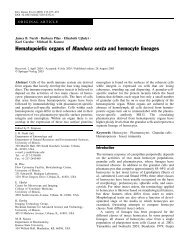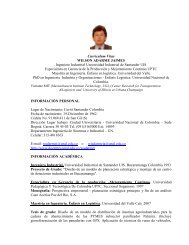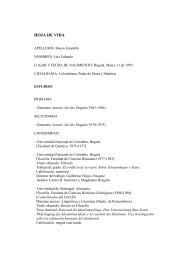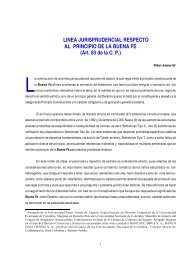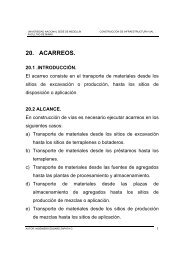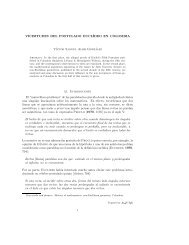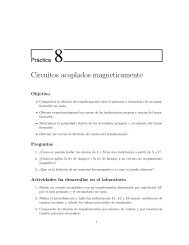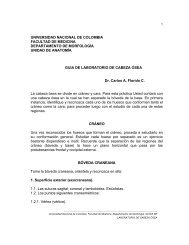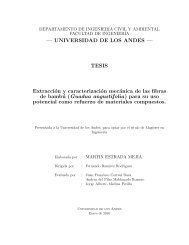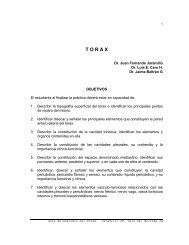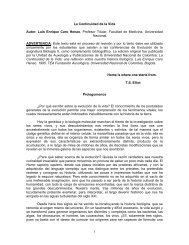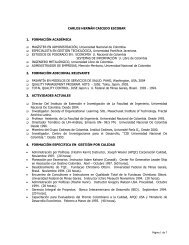PLATO AND THE LOVE OF INDIVIDUALS
PLATO AND THE LOVE OF INDIVIDUALS
PLATO AND THE LOVE OF INDIVIDUALS
You also want an ePaper? Increase the reach of your titles
YUMPU automatically turns print PDFs into web optimized ePapers that Google loves.
HeyJ XLIII (2002), pp. 311–327<br />
<strong>PLATO</strong> <strong>AND</strong> <strong>THE</strong> <strong>LOVE</strong> <strong>OF</strong><br />
<strong>INDIVIDUALS</strong><br />
T. BRIAN MOONEY<br />
The University of Notre Dame, Australia<br />
I<br />
A theory of love should explain that we love a person; that a person is<br />
in some way the paradigmatic focus of our love. Moreover, it is qua<br />
person that the beloved is loved and not just as bearer of loveable qualities<br />
or attributes; in other words, love is directed at the totality of the<br />
beloved and not identifiable (solely) with certain aspects of a person.<br />
As a result such love is held to be incompatible with the easy interchangeability<br />
of the beloved with some other with similar or ‘higher’<br />
qualities and attributes. This is not to say that love is not transferable<br />
from one beloved to another but only that such transferability is subject<br />
to loss of the unique and irreplaceable individuality (personhood) of a<br />
particular beloved. 1<br />
This particular account of what a theory of love should provide is<br />
deemed by numerous philosophers to amount to a knock-down case<br />
against any theory of love which identifies what is loved as some complex<br />
of qualities/attributes or characteristics of a beloved. 2 Plato is the<br />
central figure who is held to have missed these features of love by<br />
supposing that what we really love in loving a person are their qualities<br />
of Beauty and Goodness. However, the critique goes a lot further and<br />
applies equally to any conception of agapistic love, or indeed to any<br />
theory of disinterested compassion-love (as in Buddhism). This is so<br />
because (aside from the theological difficulty of understanding any love<br />
relation as genuine because it is commanded) when we consider our<br />
grounds for loving another person as posited by the fact that he or she is<br />
a child of God, or as a divine ‘soul’ made by God, or in terms of the<br />
universality, anonymity and ready replaceability of each and every<br />
beloved, we are not deemed to be loving such persons as persons. Rather<br />
we are loving them because God commanded us to do so, or because<br />
they are God’s children, or because they have immortal souls. In each<br />
case precisely because the love is directed towards all, and thus everyone<br />
is loved, one instance of love is exactly the same as all others; each<br />
© The Editor/Blackwell Publishers Ltd, Oxford, UK and Boston, USA.
312 T. BRIAN MOONEY<br />
instance is identical to, and replaceable by, any other, and thus in a sense<br />
the love is anonymous and universal, independent of any of the particular<br />
features which render the person individual and unique. 3<br />
In this article I look carefully at the Platonic account of eros in order<br />
to ascertain just how far these general criticisms hold water. We must<br />
however, in dealing with Plato’s theory of eros, consider a further set of<br />
criticisms specific to the Platonic project, namely, the view that Platonic<br />
eros is egocentric and acquisitive. However, in this article I shall not just<br />
engage in historical exegesis in order to correct past misunderstandings<br />
of Plato, but rather I will be using Plato’s work as an example of how we<br />
might better understand the nature of love in our own lives.<br />
Plato’s theory of love is presented in numerous dialogues but for the<br />
purposes of this paper I will restrict myself to considering only the Lysis<br />
and Symposium. I will consider various interpretations of Plato’s writings<br />
and dismiss many of the criticisms of Platonic love, and I will present<br />
a Platonic account of love which goes a long way towards capturing<br />
something of the mysterious nature of love by identifying two separate<br />
but overlapping ways of loving.<br />
II. <strong>THE</strong> LYSIS<br />
The subject matter of the Lysis is a discussion of philia. Philia is the<br />
general term in Greek for friendship, but it is quite clear that in the Lysis<br />
and generally within the Greek philosophical tradition its meaning is not<br />
exhausted by the modern English word ‘friendship’. It is often used<br />
interchangeably with eros, but it also comprises the feelings of affection<br />
one has with regard to things, as well as to familial love (storge), and<br />
even captures some aspects of desire.<br />
In the Lysis, Plato employs the terms, eran, philein, agapan, epithumein<br />
and peri pollou poieisthai, sometimes interchangeably, but certainly as<br />
loosely demarcated but closely related subsets of philia. At 215a–d the<br />
terms agapan, philein and peri pollou poieisthai are used interchangeably.<br />
4 And importantly, even before the philia group of terms are introduced<br />
in the text, and the attraction of friends is settled as the initial<br />
topic of discussion, the conversation employs for the most part the eros<br />
group of words (204–206a). The background to the discussion is markedly<br />
erotic and the subsequent discussion is stamped throughout by the<br />
sexual orientation of the opening. In fact, the philia group is used<br />
exclusively only in the discussion of familial love between 207 and 210<br />
and in the attempt to spell out a meaning for what is ‘dear’ (211e–213d). 5<br />
In the remaining sections, from 214 through to the close, there is a<br />
mixture of all the terms mentioned above, sometimes used interchangeably,<br />
at other times with only subtle changes of meaning. The<br />
point to be taken from this is in substantial accord with Kenneth
<strong>PLATO</strong> <strong>AND</strong> <strong>THE</strong> <strong>LOVE</strong> <strong>OF</strong> <strong>INDIVIDUALS</strong> 313<br />
Dover’s claim that philia and eros do not designate separate realms of<br />
meaning, but that there is a high degree of ‘overlapping’ between the two<br />
terms. 6 Thus, since I will be assuming that the doctrine of love in both<br />
the Lysis and the Symposium is one and the same, these prefatory<br />
remarks should forestall any objections that I am conflating two separate<br />
doctrines.<br />
The Lysis provides us with a structural and analytic account of loving<br />
or befriending. In this dialogue Socrates conceives of loving as comprising<br />
three elements; a lover or subject who loves, an activity – loving –<br />
(which in the Lysis is captured by the idea of actively engaging in making<br />
something ‘dear’ to oneself, not just a recognition of value but the<br />
investing of [further] value in something over time), and an object of<br />
love or beloved.<br />
The motivational force which as it were enables the lover to love is<br />
grounded in the ontological endeia (lack) of the person who loves.<br />
Because persons are not self-sufficient, agents exhibit desire which<br />
seeks out objects and subjects to fulfil the lacks which are integral to our<br />
natures. On the existential level, lack or ‘need’ is experienced in the<br />
desire for a plurality of things, including the ‘need’ for a lover or friend.<br />
Corresponding to the nature of desire and lack Socrates also thinks<br />
that the object of love (whatever object) must also be loveable. In other<br />
words, there must be something in the nature of the object of love which<br />
elicits the loving of the lover. This is not to deny that the lover actively<br />
invests value in the beloved but rather is posited as a partial explanation<br />
for the grounds of attraction. Many objects are valuable in themselves<br />
but are not ‘loved’ in the special sense of the relation. In other words the<br />
recognition of value is not sufficient to characterize the special<br />
relationship of love. In love, recognition of value requires an activity on<br />
the part of the lover which maintains and deepens through valuation the<br />
relation with the beloved.<br />
It is surprising nevertheless that neither in the Lysis nor in Diotima’s<br />
or Socrates’s speech in the Symposium do we receive any full<br />
articulation of the activities of loving; this in part explains the unease<br />
many commentators have had with Plato’s theory of eros. 7 However,<br />
Plato’s preoccupation in both the Lysis and the Symposium is with the<br />
proton philon or first (final) object of love, and the phenomenon of love<br />
is discussed only insofar as it illuminates something of the path to that<br />
object. Throughout, the two dialogues are determined by that goal. 8<br />
Having established the logical grammar of philia in the Lysis – that<br />
philia is the name of a relation and that it comprises a subject who loves,<br />
an activity of loving (couched in terms of rendering and maintaining<br />
something as ‘dear’) and an object which is loved but which also elicits<br />
our love, Socrates’s dialectical questioning focuses on the nature of the<br />
relation between subject and object of love. Kosman, in what is still the<br />
most penetrating analysis of Plato’s views on love, correctly identifies
314 T. BRIAN MOONEY<br />
the crucial elements of the theory as presented in the Lysis. 9 Having<br />
identified what is loved in terms of ontological endeia, he writes:<br />
That of which one is endees is not simply that which one does not have, nor which<br />
one wants in the sense of desires, but that which one lacks, or wants in the sense of<br />
needing, missing and requiring for the fulfilment and completion of some nature. 10<br />
When Socrates finally suggests that what persons actually lack is the<br />
plenitude of the first (final) object of love, the proton philon, he goes on<br />
highly suggestively to identify a relationship between the ‘soul’ and the<br />
proton philon. He does so by tantalizingly (and without a rigorous<br />
argument) pushing the notion that the real meaning of our ontological<br />
lack resides in what is phusei oikeion, what belongs to us naturally.<br />
Kosman once again captures the point brilliantly:<br />
The conclusion [of Socrates’s questioning] is clear and interesting, for it suggests<br />
that the proton philon is that of which we may be said to be properly endeeis,<br />
and this is our own true but fugitive nature, that which for us is phusei oikeion, even<br />
if we are separated from it. … Erotic love is thus primarily for Plato self-love, for<br />
it is finally our true self which is at once native to us and lacked by us. 11<br />
The similarity between the position outlined here and that presented by<br />
Aristophanes in the Symposium is especially noteworthy, in particular<br />
where he says that Eros is a great god who leads us eis to oikeion …, eis<br />
ten archaian phusin.<br />
While the Lysis formally ends in aporia it has covered much groundwork.<br />
It has established the logical grammar of philia as being the name<br />
of a relation; 12 it has presented the formal structure of any philia relation,<br />
in terms of a befriender, a befriending and a befriended; it has identified<br />
but not articulated the active on-going valuation which characterizes the<br />
activity of befriending; and it has managed to suggestively tie up a nexus<br />
of ideas which intrinsically link the ontological lack of the befriended<br />
with an organic wholeness which the befriender attempts to overcome by<br />
loving the friend. (Moreover, the organic wholeness which is described<br />
as our true nature is both subject and object of love.) However, the<br />
emphasis of the dialogue lies in the vertical dimension of philia which<br />
takes the befriender in the direction of the transcendent object of love –<br />
the proton philon. While this is well-recognized it is complemented by the<br />
notion that there is an intrinsic relation between this transcendent object<br />
of love and our original nature. This insight will be of some importance<br />
later in the article.<br />
The importance of the Lysis in Plato’s articulation of a theory of love<br />
cannot be overestimated. Indeed it provides a kind of prolegomena to the<br />
account in the Symposium (rendered by Diotima via Socrates) which takes<br />
up the aporetic close of the Lysis by continuing to illuminate further the<br />
nature of the proton philon. That the two dialogues are intimately linked
<strong>PLATO</strong> <strong>AND</strong> <strong>THE</strong> <strong>LOVE</strong> <strong>OF</strong> <strong>INDIVIDUALS</strong> 315<br />
is clear when we look at the dialectical interchange between Socrates<br />
and Agathon at Symposium 198b–201d. Here we get an almost verbatim<br />
rendition of the arguments in the Lysis which establish the logical grammar<br />
of eros as a relation and its structural elements, rendered now in the<br />
language of eros, as lover, loving and beloved. It is this analytic that<br />
provides the truth conditions for the subsequent myth of eros and afterwards<br />
the elaboration of the lower and higher mysteries of love.<br />
III. <strong>THE</strong> DIALECTICAL INTERCHANGE BETWEEN<br />
SOCRATES <strong>AND</strong> AGATHON<br />
As I have pointed out, the preliminary truth conditions for the proper<br />
discussion of love had been settled in the Lysis and repeated almost<br />
verbatim in the Symposium. I will briefly rehearse the manner in which<br />
they are dramatized in the Symposium and show how they affect the<br />
account given there of the nature of love and the lower and higher<br />
mysteries of love.<br />
The purpose of encomia is to render a eulogy or ‘good word’. In the<br />
Symposium the encomium will be to Eros, but Socrates immediately<br />
changes the ground rules adhered to by the other speakers. For Socrates,<br />
an encomium must be true for if it were not true it would not be good.<br />
Hence, he will deliver one which picks out the fairest of the facts about<br />
eros and praise them (198d5–7). (He will not focus on the destructive<br />
passion of eros so vividly portrayed in Homer’s Iliad and Odyssey, and<br />
by Plato as the eros turannos of the Politeia.)<br />
Before presenting the encomium proper developed through Diotima,<br />
Socrates takes up the logical grammar of eros in his interchange with<br />
Agathon. He asks Agathon:<br />
So come now, complete your beautiful and magnificent description of Love, and tell<br />
me this: Are we so to view his character as to take Love to be love of some object<br />
or of none? (Symp. 199c8–d2).<br />
This is the same question asked in the Lysis. Formally it seems as if<br />
Socrates is asking whether or not eros is intentional – whether eros is<br />
eros of something. But this is not quite the point as Socrates goes on to<br />
suggest by amplifying his question. His clarification continues:<br />
My question is not whether he is love of a mother or a father – how absurd it would<br />
be to ask whether Love is love of mother or father! – but as though I were asking<br />
about our notion of ‘father’, whether one’s father is a father of somebody or not<br />
(Symp. 199d2–6).<br />
Socrates is thus highlighting that Eros like the term Father is the name<br />
for a relation. Moreover, it is the name for a relation which comprises<br />
the lover, the activity of loving and the beloved (see 200e–210a).
316 T. BRIAN MOONEY<br />
The lover desires the object of his/her love and thus lacks that object,<br />
but it is this lack that explains the very phenomenon of desire. We desire<br />
because we lack. Moreover, this phenomenon has both a temporal and<br />
an eternal element. Desire is not just for something lacked but for the<br />
preservation of what good we may achieve and which might be taken<br />
away. The point Socrates is making is fundamentally that desire has<br />
something of the infinite in its nature. The only thing that could possibly<br />
satisfy fully and completely the nature of a desirous and thus lacking<br />
being is the eternal satisfaction of desire or, from a slightly different<br />
perspective, the complete cessation of all desire. Such could only be<br />
found in a world-transcendent object of desire which is itself a pleroma,<br />
because the satisfaction of all temporal desires is capable of being lost;<br />
moreover, because we desire ultimately such an object, we desire to<br />
become that object or at least to be in the presence of that object. (On<br />
one reading at least this might be portrayed in Sartrean terms as the<br />
desire of the pour-soi to become a pour-soi/en-soi.)<br />
IV. <strong>THE</strong> LOWER <strong>AND</strong> HIGHER MYSTERIES<br />
Having established these distinctions Socrates introduces Diotima as<br />
source for the doctrine of eros to be presented. Mythically eros is the<br />
name of the relation which exists between the temporal and the eternal,<br />
the human and the Divine. That Eros cannot be God is ‘proven’ by the<br />
fact that human beings love and they establish the relation of love via<br />
desire which is grounded in lack. Since it is axiomatic that the Divine<br />
lacks nothing, love cannot be a divinity. Rather love is said to be the<br />
great daimon which unites the disparate orders of the real, or if not<br />
unites, at least establishes the relation between them.<br />
Because Eros is the name for a relation, it occupies the metaxy, that<br />
is, whatever is intermediate, whether that be conceived of as opinion,<br />
lying intermediate between error and truth, or the ‘realm’ between mortals<br />
and the Divine. Eros takes from its mother the brute fact that it is a<br />
relation between the Divine and the human, the Heavens and the world,<br />
and, it is intimated by Plato, the passive ‘intuition’ of this relation, and<br />
the element of lack. From its father it derives its capacities to scheme,<br />
hunt, create and fashion. In other words it derives its active or desirous<br />
element from the masculine side of its parentage, as is suggested also by<br />
the various meanings of poros – path, way, passage, but also resource.<br />
The active element provides the impetus to overcoming lack.<br />
The dialectical interchange between Socrates and Agathon reestablishes<br />
the logical grammar of eros together with a structural account<br />
of what eros involves, just as had been done in the Lysis. The myth<br />
relates these ‘logical’ categories of eros to the framework which establishes<br />
the relation between the human and the Divine. As a matter of
<strong>PLATO</strong> <strong>AND</strong> <strong>THE</strong> <strong>LOVE</strong> <strong>OF</strong> <strong>INDIVIDUALS</strong> 317<br />
continuity Diotima will present a vision of the manner in which Eros via<br />
desire is always attempting to satiate lack and how such satiation requires<br />
a transcendent object of Eros. 13<br />
Diotima identifies the object of love as ‘having’ or ‘being in the presence<br />
of’ Beauty, following her question ‘what is the love of the lover of<br />
beautiful things?’ (204d6). (All references to the Symposium in this article<br />
are to the Loeb translation.) Quickly she identifies the beautiful and the<br />
good. However, drawing upon Aristophanes’s speech it is claimed that<br />
the lover is indeed searching for completion/fulfilment with the other<br />
half (205e) but only if that fulfilment is deemed good.<br />
Collecting the analysis provided by the dialectical interchange with<br />
Agathon and the myth, Diotima suggests that the essential motivation<br />
proper to love is that ‘love loves the good to be one’s own forever’<br />
(206a12–13). Everyone qua lover is lover of the good. The method of<br />
achieving the good by the lover ‘is procreation in what is beautiful with<br />
the body and soul’ (206b8–9).<br />
It is at this point in the dialogue that a very new emphasis is placed<br />
on eros. Whereas before eros had been identified primarily in terms of<br />
the lover’s lack and the lover’s desires to ‘fill’ these lacks, it now takes<br />
on a distinctively ‘poetic’ role in including desires for begetting and<br />
bringing to birth. 14 Moreover, the two elements of love considered as<br />
lack and as desire to produce are maintained at each level of the ladder<br />
of love. Further, this is a corollary of the two aspects of eros identified<br />
in the myth of love where on one side love lacks its object and on the<br />
other it provides a means of achieving its object.<br />
Primarily eros (in the lower mysteries) is creative according to its<br />
thirst for immortality which is carried out through begetting. Just as in<br />
the animal kingdom a vicarious immortality is preserved through the<br />
propagation of offspring, so too at the human level, the creative desire<br />
to bring forth children is thought to be indicative of this desire for<br />
immortality. This is conceived of in terms of a general principle or law<br />
of nature. However, while animals are restricted in the sense that this is<br />
the only form of immortality open to them, humans can achieve a<br />
vicarious immortality in other ways according to their natural powers.<br />
So humans are in love with what is immortal (208e2–3) and achieve it<br />
according to both body and soul.<br />
From here Diotima leads Socrates ever upward in the so-called<br />
Higher Mysteries of love moving from love of a beautiful body to the<br />
vision of the Beautiful in itself.<br />
V. <strong>THE</strong> CRITIQUE<br />
The criticisms of the Platonic theory of love have a long and distinguished<br />
pedigree, and, as I have argued, they are applicable to any
318 T. BRIAN MOONEY<br />
theory of love which identifies what is loved in loving others as situated<br />
in anything other than the integral individual personhood of persons,<br />
whether that be conceived of in terms of a person’s qualities, attributes,<br />
characteristics or in terms of a religious command and its correlative<br />
account of why we ought to love persons, or indeed to the notions of<br />
disinterested love or compassion. In general, the following sorts of<br />
criticisms are found: Platonic love is (a) acquisitive; (b) egocentric and<br />
(c) non-personal. To these general criticisms can be added a more specific<br />
one: Platonic love devalues persons. The list of philosophers who<br />
have argued against Plato’s theory of love is impressive and includes<br />
Nygren, Vlastos, Nussbaum, Singer and Solomon. 15<br />
The voices which have stood out in favour of the Platonic view are<br />
few and even when they have attempted to vindicate Plato’s theory they<br />
have for the most part done so unconvincingly. Cornford and Markus<br />
attempted to show that Plato’s theory of eros is compatible with the<br />
Christian ideal of love-agape (as has Brentlinger), but even though they<br />
are convincing in their appeals, this fails to vindicate the Platonic theory,<br />
for as I have pointed out, the Christian view of agape suffers from the<br />
central problem that because it is commanded, universal and substitutable<br />
it cannot account for the unique and irreplaceable love which we<br />
have for special individuals. 16 So aside from the central merits these<br />
arguments have in establishing the compatibility of Platonic eros with<br />
Christian agape, the crucial objection still stands.<br />
Brentlinger, in arguing that Platonic eros cannot profitably or easily<br />
be distinguished from Christian agape provides a series of reflections<br />
which adequately resist the criticisms that Platonic eros is egocentric<br />
and acquisitive but does not convincingly show that Plato’s theory does<br />
not devalue persons. And the most penetrating analysis to date, by<br />
Kosman, while also showing that Platonic eros is not narrowly egoistic<br />
or acquisitive and that it is compatible with love of persons qua persons,<br />
fails to articulate an answer to the Symposium’s doctrine that persons are<br />
to be considered a ‘small’ thing in comparison to love of the Good and<br />
Beautiful.<br />
Let us rehearse the arguments here. Because Plato identifies the<br />
origins of love in ontological lack and subsequent operative desires to<br />
fill this lack, it is claimed that eros is essentially acquisitive. It seeks to<br />
appropriate the good for oneself and this is held to be incompatible with<br />
loving the other for his or her own sake. This argument is most<br />
forcefully pursued by Nygren. 17 Abstracting from Plato here, it can be<br />
argued that this is a rather futile criticism because it fails to capture<br />
the notion that we can have different kinds of desires, some selfish and<br />
some unselfish. For example, I can legitimately desire a better world not<br />
just for myself but for others and even for future generations. I can also<br />
desire the well-being of another person without that well-being being<br />
the source of any specific positive outcome for myself; and so for many
<strong>PLATO</strong> <strong>AND</strong> <strong>THE</strong> <strong>LOVE</strong> <strong>OF</strong> <strong>INDIVIDUALS</strong> 319<br />
benevolent other-concerned desires. Desire, therefore, is not essentially<br />
acquisitive. But perhaps the objection is not so much general as specific<br />
to Plato. Thus, the claim will be that the Platonic theory of eros as<br />
articulated in the Dialogues is such that it is presented in a way which<br />
does not allow for this general response. Nygren writes: ‘Even where<br />
Eros seems to be a desire to give it is still in the last resort a “will-topossess”;<br />
for Plato was fundamentally unaware of any other form of love<br />
than acquisitive love.’ 18 Similarly, Singer suggests: ‘For desire is always<br />
acquisitive and its object a mere commodity designed to satisfy.’ 19<br />
These sorts of objections are, however, not fair to Plato. One of the<br />
problems which issue in these kinds of criticisms is grounded in a point<br />
of scholarship. It is often supposed that Socrates talks about the object<br />
of love being ‘possessed’ by the lover (200d10–11). However, the<br />
English term ‘possess’ is an inadequate rendition of the more neutral<br />
Greek echein. Echein and its derivatives refer to ‘having’ without the<br />
emphasis of ‘owning’ and ‘possessiveness’, and thus exclusivity. We<br />
talk, for example, of having a friend, even a best friend, without implying<br />
in any way that we own or possess the friend. Indeed in the Symposium<br />
Plato describes the relationship between desire and the good not<br />
just in terms of having (echein) but often in terms of the word parontas<br />
(being in the presence of). This latter term captures the transcendent<br />
quality of the good without implying that it is subject to ‘possession’ by<br />
a lover. Moreover, it leaves open the alternative sketch of desire presented<br />
above whereby we can desire the good for another without any<br />
stigma of acquisitiveness.<br />
A similar ambiguity attaches itself to the idea that what is loved are<br />
‘good or beautiful things’. Here the acquisitive aspects of Platonic love<br />
are highlighted by the idea that the lover desires good or beautiful things<br />
for himself or herself. Given that Diotima appeals to the notion of participation,<br />
it is perhaps not useful to maintain this translation. To better<br />
capture the force of the Platonic argument, the translation should be the<br />
good or beautiful as it inheres in things. Once again this suggests that<br />
there is not a relationship of possessiveness attached to the relationship<br />
with the good and beautiful, thus leaving open the notion that a more<br />
disinterested element can be present in desire. Admittedly, the ambiguity<br />
is difficult to dispel, as Plato in discussing the genesis of love and its<br />
transcending strains does indeed suggest that at one stage desire is for<br />
or of beautiful things. However, this refers to the genesis of love in<br />
finding objects and qualities which fill lacks. At later stages, love is<br />
clearly identified as of or for the qualities that inhere in things and not<br />
just of the things themselves. In what sense this can be seen as acquisitive<br />
possessiveness is at the least very unclear.<br />
Plato’s theory of eros is also held to be egocentric. This objection also<br />
fails on grounds analogous to the acquisitiveness criticism. Whereas the<br />
acquisitive objection holds that Plato’s account of love is determined by
320 T. BRIAN MOONEY<br />
possession of the object of love and is thus incompatible with loving<br />
another for his or her own sake, the egocentric objection pushes this<br />
criticism somewhat further by claiming that the motivation and activities<br />
of all Platonic love is focused on the self. Again the criticism focuses on<br />
the relationship between lack, desire, and the good/beautiful. However,<br />
it has rightly been pointed out by Brentlinger that Plato does not make<br />
desire and love synonymous: ‘Love, [Socrates] says, desires its object<br />
(200a). He does not say that love is a desire, much less that love and<br />
desire are the same.’ 20<br />
Indeed this seems fairly obvious. Clearly, I can desire many objects<br />
without thereby loving them. Love, however, includes desire both in<br />
terms of setting on an object to be loved and in terms of desiring to<br />
‘give’ or ‘procreate’ in the presence of the Good/Beautiful. Love is the<br />
name of a relation which is characterized partly in terms of desire, but<br />
includes active valuation and recognition. Moreover, it is precisely the<br />
egocentric interpretation of the lack/desire model which renders incomprehensible<br />
the crucial move in the Symposium between the lack/desire<br />
conception of the genesis of eros and the alternative vision that because<br />
all persons are pregnant in body and soul they desire to give/procreate in<br />
goodness and beauty. Once again this opens up the perspective which<br />
enables love to be considered in terms of non-egocentric desires.<br />
Platonic love is said to be non-personal. By this most commentators<br />
have meant that because eros is focused on the good/beautiful and thus<br />
on qualities which inhere in individuals, it is therefore only accidental<br />
that we love persons. In other words, persons qua persons are not the<br />
objects of love. In loving a person for his or her qualities, we are loving,<br />
as Vlastos put it, ‘that abstract version of persons which consists of the<br />
complex of their best qualities’. 21 To this he adds:<br />
Since persons in their concreteness are thinking, feeling, wishing, hoping, fearing<br />
beings, to think of love for them as love of objectifications of excellence is to fail to<br />
make the thought of them as subjects central to what is felt for them in love. 22<br />
The intuition that somehow the person loved is irreplaceable and unique<br />
and loved as such is deemed to be missing from the Platonic theory.<br />
This is a serious objection if our intuitions and experiences of love are<br />
to be vindicated. One reply might be to show that there is an integral<br />
relation between persons and their qualities and thus to exhibit the notion<br />
that the qualities are, at least in terms of the beloved, not separable. Thus<br />
to adulterate something of Brentlinger’s analysis, 23 we might argue that<br />
I love a pint of Guinness and in attempting to say what it is about<br />
Guinness that I love, I can point to certain qualities of the pint. I enjoy<br />
and love the manner in which it is pulled, its taste, its aroma and its<br />
colourful blend of dark and cream. When describing my love of a pint<br />
of Guinness this way it is not at all clear that I am saying that I love these
<strong>PLATO</strong> <strong>AND</strong> <strong>THE</strong> <strong>LOVE</strong> <strong>OF</strong> <strong>INDIVIDUALS</strong> 321<br />
properties/attributes/qualities, and that the pint of Guinness is a means<br />
to achieving these ends. But in making these claims about what I love, I<br />
am doing no such thing; these are things about the pint of Guinness that<br />
I love, they are not separable from it. While I might also love a pint of<br />
bitter, also for its taste, its colour, its aroma, these qualities as instantiated<br />
are different to those in the pint of Guinness and thus in no way<br />
substitutable. In part my love for the pint of Guinness is attributable to<br />
historic/cultural circumstances peculiar to my own identity. 24<br />
Roger Scruton suggests that there is a difference between an emotional<br />
reaction to universals and one to particulars. 25 He is no doubt<br />
correct. One can, for example, love a universal like justice, caring about<br />
it passionately, as an ideal and working tirelessly to achieve justice in<br />
one’s own life and in the world around one. One also loves a particular<br />
person and the kind of attachment one has to that person does indeed<br />
seem different. Robert Brown appeals to this distinction in his<br />
platonizing conception of love in his book Analysing Love. 26 Brown thinks<br />
that love of individuals is to be understood in terms of characteristics or<br />
qualities. He argues that we love a particular person because that person<br />
exhibits certain qualities in a unique manner. Moreover, this concatenation<br />
of qualities, including potential ones, is part of an open-ended<br />
commitment to the bearer of these qualities, and thus leaves open the<br />
possibility that there may be development of new or different qualities.<br />
The universals (the qualities) are loved, then, as they are exhibited by<br />
the subject. In other words there is a symbiotic relationship between the<br />
universal qualities which both attract and are loved and the subject<br />
within which these qualities inhere.<br />
Now this sort of appeal seems to work quite well for the Platonic<br />
theory of eros. By arguing that what is loved in another person is not just<br />
qualities but the qualities as exhibited and instantiated in the beloved,<br />
one appears to avoid the difficulty that love is non-personal. If the<br />
symbiotic relationship between qualities and the subject which<br />
instantiates them is maintained one thereby explains the fact that one<br />
does love qualities but also persons. Moreover, it also, by appealing to<br />
the manner of instantiation, accounts for the historical features which<br />
contribute to the development of a love relationship as well as highlighting<br />
the uniqueness and irreplaceability of the particular instantiation.<br />
It might nevertheless be thought that the sort of symbiosis<br />
appealed to here is still not a love of the whole person. 27 However, aside<br />
from the difficulty of saying, let alone knowing, what constitutes a<br />
whole person, given that we can scarcely say that about our own self, the<br />
symbiotic argument is sufficiently open-ended, because of its appeal to<br />
the manner of instantiation, to sway the decision.<br />
However, there is still a more damaging objection to Plato’s theory of<br />
love which does not seem to be capable of being resolved by the above<br />
arguments. The previous arguments, which in principle the Platonic
322 T. BRIAN MOONEY<br />
theory can address, were arguments which attacked Plato’s view of love<br />
because it was deemed to be impersonal, not love of the whole person,<br />
and to be a love that is replaceable, egocentric and acquisitive. These<br />
objections, I believe, have been answered. But in the Symposium Plato<br />
seems to say that love of persons is of less value than love of qualities<br />
as instantiated in other things and ultimately to the Idea of Beauty/Good.<br />
The issue arises in the context of the transcendent mysteries of love<br />
proclaimed by Diotima. Here, after having suggested that the Higher<br />
mysteries require both a daimonic nature and a ‘guide’, she argues that<br />
certain minimal conditions of beauty must exist in the environment of<br />
the initiate before he or she can progress on the ladder of love. I take this<br />
to be a consequence of Diotima’s requirement that the initiate from<br />
youth must encounter beautiful bodies (and because elsewhere Plato<br />
insists that a sound environment is a prerequisite to right reasoning – see<br />
Politeia 491c).<br />
If the environment is suitable the person who is directed correctly must<br />
love a particular body and engender beautiful discourse (209a9–b1).<br />
This follows from the model that desire has a moment of lack and a<br />
moment of giving, creativity or bringing to birth. The next stage in the<br />
ascent comes when the lover acknowledges that what is beautiful in one<br />
body is adelphon or closely related to that in any other body. Moreover,<br />
if he seeks beauty in form (eidei) he must recognize that the beauty of<br />
each individual body is an example of beautiful bodies in general, and<br />
unless he is to be guilty of anoia he must come to love all beautiful<br />
bodies; and in doing so must also ‘loosen’ his attachment to one particular<br />
body considering it to be smikron. This is the first intimation that the<br />
transcending strains of eros involve a diminution in attachment to<br />
particulars, where the general take precedence over the particular, here<br />
specifically the beauty in all bodies over the beauty in one. But Plato<br />
will go further. Attention moves from the love of the beauty as it inheres<br />
in bodies to love of beauty in a single person, and then to the beauty<br />
exhibited generally in all souls. From here the vertical movement goes<br />
towards love of learning in general (the sciences), up to the final stage<br />
of the ascent which involves the ‘graciously’ given vision of the<br />
Beautiful/Good itself, the transcendent object of love. The problem<br />
becomes particularly acute because at each level of the ascent Plato<br />
suggests that certain negative attitudes (kataphronesanta b5–6) must be<br />
taken up in respect to the lower instantiations of the beautiful. This<br />
means, it would seem, that anything other than the Beautiful itself must<br />
be viewed negatively and thus also persons. This is strangely counterintuitive.<br />
A. W. Price has pointed out that the attitudes of disdain or looking<br />
upon the lower instantiations of beauty does not thereby render them not<br />
beautiful. As he puts it: ‘Diotima’s theme is that Beauty itself is<br />
supremely beautiful, and not that the lesser beauties are no beauties at
<strong>PLATO</strong> <strong>AND</strong> <strong>THE</strong> <strong>LOVE</strong> <strong>OF</strong> <strong>INDIVIDUALS</strong> 323<br />
all.’ 28 Moreover, he goes on to argue that what Diotima rejects ‘is an<br />
exclusive devotion to some particular instances of beauty and not a<br />
liberal attachment to all kinds and instances of beauty’. 29 But even if this<br />
is true it doesn’t seem to do justice to the special nature of one’s love for<br />
another unique individual. Price thinks that the ascent can be interpreted<br />
‘as an account of how lover and beloved mutually develop their interest<br />
in beauties that are more universal (by advancing horizontally) and more<br />
high-flown (by advancing vertically)’. 30 But this seems to run counter to<br />
the expressed view of Diotima that one must divest oneself (at least to<br />
some extent) of attachment to the particular in favour of the path to transcendent<br />
beauty.<br />
The move from the recognition of beauty of soul to that of beauty of<br />
laws, institutions, branches of knowledge, philosophy and finally transcendent<br />
beauty involves, according to Diotima, a ‘lessening’ of value<br />
for particular instantiations. Price certainly presents an interpretation<br />
which gives some weight to the notion that in a certain manner the love<br />
of the individual beloved may be preserved throughout the ascent but<br />
this is not enough to suggest that the beloved is loved as a unique individual<br />
whole person. Price cites as evidence for his view 211b5–7 where<br />
Diotima says: ‘Whenever someone, ascending from these things through<br />
loving boys rightly (dia to orthos paiderastein) begins to see that<br />
Beauty, he would almost be touching the goal.’ And he thinks that this<br />
‘implies that right up at least to the beginning of the end of his ascent<br />
the lover is still, in a manner, loving a boy’. 31 Moreover, Price finds the<br />
strongest evidence for interpreting the ascent as an exercise of personal<br />
love in the fact that Diotima’s original definition of love involved<br />
aiming at:<br />
immortality through generation in beauty and in particular the educative pederasty,<br />
described in the so-called lesser mysteries of 200. Though it is only the discourse<br />
of 210c1 that is specified as being educative (c2–3), the emphasis upon discourse at<br />
every level (a7–8, c1–5, d4–6) confirms that communication is always the goal (209<br />
b7–c2).<br />
While I think there is clearly merit in Price’s view, it still seems to strain<br />
the text because; 1) it does not give sufficient weight to the notion that<br />
Diotima thinks there must be negative attitudes taken up in respect to the<br />
lower instantiations, 2) even if education and communication are still<br />
fundamental goals of the ascent, it is unclear in what sense the beloved<br />
is loved as person, and 3) as I have already pointed out, there are strong<br />
reasons for thinking that Plato holds that without having ‘seen’<br />
Transcendent Beauty, all objects of love cannot be loved ‘truly’. Diotima<br />
tells us that once the lover has seen transcendent beauty, he will then<br />
bring to birth upon the visible manifestations of Beauty not illusions but<br />
true examples of virtue 212a5–7. Such ‘truth’ is clearly supposed to be<br />
contrasted with the ‘semblances’ mentioned earlier in the speech when
324 T. BRIAN MOONEY<br />
Diotima is talking about vicarious immortality. It might further be<br />
thought that just as it is only after having apprehended transcendent<br />
beauty that the lover can beget true virtue (212a7–9), it may be that only<br />
then is he capable of truly loving the particular.<br />
So it would seem that the final objection really does capture what<br />
Plato holds to be central to an account of love, and that therefore his<br />
theory does fail to accommodate some of our deepest intuitions about<br />
love of persons.<br />
However, while there is, I think, this inevitable tension in Plato<br />
between the concern for the transcendent object of love and love of<br />
persons, there may still be a further response which captures yet other<br />
intuitions about love. There is surely a difference between recognizing<br />
the transcendent object of love as the ultimate source of value and still<br />
holding that certain beloveds are still loved as unique individual whole<br />
persons. Plato argues that knowledge of the good implies a kind of<br />
identification with that object. Now if we follow this account it might be<br />
said that this process of identification marks out what is truly loveable<br />
in the other, such that in loving the person we are in some mysterious<br />
way loving what that person most essentially is. This was the doctrine<br />
espoused in the Lysis that the object of love is immanent in the soul of<br />
the persons. As Kosman puts it:<br />
To love the beautiful in me is thus to love my essential being, my ‘realest’ self.<br />
Provisionally and within the context of self-love, I suggest then that talk of beauty<br />
as the proper object of eros is talk of eros as directed toward what is truly native to<br />
us and that in turn (i.e. circularly) may be thought of as the self which manifests our<br />
good and beautiful nature: i.e. the nature which we love … In self-love, lover and<br />
beloved are one; but such love is always love of the ‘ecstatic’ self. 32<br />
Applying this insight to the love of others, Kosman continues:<br />
If I love A because of ϕ or love the ϕ in A, I should not be said to love something<br />
other than A if ϕ is what A is. Thus to love A for its beauty is to love A for itself.<br />
But loving A for himself is not totally unconditional agapic love, because in loving<br />
A for himself, I don’t love what A happens to be, but A qua beautiful and this means<br />
loving A for what he is, in spite of what he may happen to be, or for the mode of<br />
his being what he is. 33<br />
The views just expressed do seem to capture something of the mysterious<br />
element which many people commonly hold and which in part<br />
explains the difficulties even reflective lovers have in saying what it is<br />
that they love about the beloved. As presented here it is only a sketch but<br />
it goes some way to explain this mysterious element. Plato scarcely<br />
anywhere (except in his description of Alcibiades in the Symposium so<br />
brilliantly portrayed by Nussbaum, and in the Phaedrus) 34 discusses in<br />
any systematic way the special bond of love between individuals, his<br />
focus is always upon the transcendent object of love, but this does not
<strong>PLATO</strong> <strong>AND</strong> <strong>THE</strong> <strong>LOVE</strong> <strong>OF</strong> <strong>INDIVIDUALS</strong> 325<br />
mean that his theory cannot accommodate an account of loving persons<br />
qua persons.<br />
VI. AN EXHORTATION<br />
To tie up the various reflections on loving persons in this essay, I would<br />
like to present a twofold conception. On the one hand love of a<br />
particular person is grounded in the historic/existential nature of a<br />
couple’s facticity. By this I mean that the reason I love Fionnuala rather<br />
than Siobhan who has the same qualities to a higher level than Fionnuala<br />
is explicable partly in terms of the history of my, and her, life. A range<br />
of factors partially explain my love including all those factors,<br />
sociological, cultural, genetic and historical that go into me being the<br />
kind of person I am and the kind of person she is. While it is true to say<br />
that I love her qualities, it is better to say that I love the qualities as<br />
instantiated in her, in other words, I love her as bearer of these qualities;<br />
and it is precisely Fionnuala as bearer of these qualities who is<br />
irreplaceable, unique and individual. While I might admire and even<br />
love such qualities or others in another person, my attachment of love is<br />
to the historical person Fionnuala, and is sustained by among other<br />
things commitment and care for her built up over many years of shared<br />
fortunes.<br />
But there are other senses somewhat more mysterious. Fionnuala,<br />
despite all the things about her that I love, often fails to live up to her<br />
own ideals. She is like myself all too human. But part of what I love<br />
about her are her commitments to ideals some of which I may not share.<br />
But it is not just that I love her commitment to certain ideals but rather<br />
that these are partly constitutive of her identity. The failure to live up to<br />
them, in no way abrogates that part of her self which identifies with them.<br />
She is in part her ideals even if they are so rarely achieved if indeed<br />
ever. In a sense I love her fugitive self. This follows one line of Plato’s<br />
reasoning.<br />
Moreover, there is also an important sense in which I love Fionnuala<br />
for her very being. Let us imagine, God forbid, that Fionnuala were to<br />
be involved in a car accident which left her comatose. She can no longer<br />
communicate with me, nor let us suppose, me with her. I still love her.<br />
Yet my love is clearly not directed towards her qualities or indeed presently<br />
any element of our historical vicissitudes. How is this explicable?<br />
It might be thought that I am loving a memory or series of memories of<br />
her. But this does not ring true to my experience nor indeed the<br />
experiences of people who have actually been in this kind of situation.<br />
So it might be that I love her in some form of expectation of her<br />
recovery. While this may be true it does not quite capture what it is that<br />
I love while she is comatose, and besides the doctors and surgeons have
326 T. BRIAN MOONEY<br />
advised me that she will not recover. Further unthinkable decisions for<br />
me may have to be made. Part of my own identity lies there with her in<br />
the hospital bed. Much of what is meaningful and good for me is also<br />
placed in jeopardy by this tragedy.<br />
There is a story told that each person has an immortal soul which is<br />
‘akin’ to the Divine, and while it is certainly the case that I love<br />
Fionnuala as embodied, there seems to be some kind of intuitive ‘rightness’<br />
to the notion that ultimately what I love in Fionnuala (at least on<br />
one level) is her very being, her soul, her spirit. These provide some of<br />
the grounds for faith in this matter, though doubtless this element is<br />
largely abstracted from her concrete individuality, and may not even be<br />
individual. But it may be moreover that while logos fails and mythos<br />
takes over there is an experiential appeal to the notion that it is only from<br />
the depth of the experience of the loving person that we begin to<br />
understand what is involved in loving persons.<br />
Notes<br />
1 For an account of some of these undergirding intuitions to a theory of love, see, for example,<br />
Martha Nussbaum, The Fragility of Goodness (Cambridge: Cambridge University Press, 1986); and<br />
Stephen Leighton, ‘What We Love’, Australasian Journal of Philosophy 71, 2 (1993), pp. 145–58.<br />
2 See for example, G. Vlastos, ‘The Individual as Object of Love in Plato’, Platonic Studies,<br />
Princeton, 1973.<br />
3 For a useful exploration of these issues see Robert Adams, ‘The Problem of Total Devotion’<br />
in Neera Badhwar, Friendship: A Philosophical Reader (Ithaca: Cornell University Press, 1993).<br />
4 See L. Versenyi, ‘Plato’s Lysis’, Phronesis 20 (1975), pp. 185–98.<br />
5 Ibid., p. 187<br />
6 See K. Dover, Greek Homosexuality (Cambridge: Harvard University Press, 1978), p. 50.<br />
7 Some hints however may be gleaned from the speeches of Aristophanes and Alcibiades.<br />
8 The issues raised rather quickly here are explored in some detail in my ‘Plato’s Theory of<br />
Philia in the Lysis: A Defence’, Irish Philosophical Journal 7 (1990), pp. 131–59.<br />
9 A. Kosman, ‘Platonic Love’ in W.H. Werkmeister (ed.), Facets of Plato’s Philosophy (Assen:<br />
Van Gorcum, 1976), pp. 53–69. References in this article are to the version in A. Soble (ed.), Eros,<br />
Agape and Philia (New York: Paragon House, 1989).<br />
10 Kosman, p. 155.<br />
11 Ibid., p. 156.<br />
12 This point seems to have been missed by many commentators who tend to emphasize the<br />
intentional nature of philia/eros. Among commentators who have emphasized the distinction Plato<br />
makes see R. E. Allen, The Dialogues of Plato, Vol II, The Symposium (New Haven: Yale University<br />
Press, 1991); R. E. Allen, ‘A Note on the Elenchus of Agathon: Symposium 199–201’, Monist 50<br />
(1966), pp. 460–3; and D. N. Morgan, Love: Plato, the Bible and Freud (New Jersey, 1964).<br />
13 For a fuller discussion of the arguments underlying the elenchus of Agathon see my ‘The<br />
Dialectical Interchange between Socrates and Agathon’, Antichthon 28 (1994), pp. 16–24.<br />
14 See also R. A. Markus, ‘The Dialectic of Eros in Plato’s Symposium’ in G. Vlastos (ed.),<br />
Plato, vol. II (New York: Doubleday, 1970), p. 138.<br />
15 See A. Nygren, Eros and Agape (Philadelphia: Westminster Press, 1953); Vlastos, ‘The<br />
Individual’; Nussbaum, Fragility of Goodness; I. Singer, The Nature of Love, 3 vols., (Chicago:<br />
University of Chicago Press, 1984); R. C. Solomon, Love: Emotion, Myth and Metaphor (New<br />
York: Doubleday, 1981).<br />
16 See Markus, ‘The Dialectic of Eros’; F. M. Cornford, ‘The Doctrine of Eros in Plato’s<br />
Symposium’ in W. K. C. Guthrie, The Unwritten Philosophy (Cambridge: Cambridge University<br />
Press, 1950); J. Brentlinger (ed.), The Symposium of Plato (New Haven: University of Massachusetts<br />
Press, 1970). References to Brentlinger in this paper are to the version in C. Williams (ed.), On Love<br />
and Friendship (Boston: Jones and Bartlett, 1995), pp. 157–66.
<strong>PLATO</strong> <strong>AND</strong> <strong>THE</strong> <strong>LOVE</strong> <strong>OF</strong> <strong>INDIVIDUALS</strong> 327<br />
17 Eros and Agape.<br />
18 Ibid., p. 76.<br />
19 Nature of Love, vol. I, p. 89.<br />
20 In Williams (ed.), On Love and Friendship, p. 165, note 3.<br />
21 ‘The Individual’, p. 31.<br />
22 Ibid., p. 32.<br />
23 In Williams (ed.), On Love and Friendship, pp. 159–60.<br />
24 It might be thought, however, that this argument does not do the work it needs to do in the<br />
case of loving another person because while (for the most part) one pint of Guinness is substitutable<br />
for any other pint of Guinness, our intuitions about loving other persons do not allow for such easy<br />
replaceability. Later in the article I will show that there are other factical aspects to a love relation<br />
with another person which escape this difficulty. Nevertheless, for the moment it will suffice to<br />
argue that the Platonic theory is not incompatible with the idea that the instantiation of qualities<br />
requires an attachment not just to the qualities but also to the objects within which they inhere.<br />
25 R. Scruton, Sexual Desire (London: Weidenfeld and Nicolson, 1986).<br />
26 R. Brown, Analyzing Love (Cambridge: Cambridge University Press, 1987), pp. 106–7.<br />
27 See S. Leighton, ‘What We Love’, pp. 152–3.<br />
28 A. W. Price, Love and Friendship in Plato and Aristotle (Oxford: Clarendon Press, 1989),<br />
p. 44.<br />
29 Ibid.<br />
30 Ibid., p. 45.<br />
31 Ibid., p. 48.<br />
32 ‘Platonic Love’, p. 159.<br />
33 Ibid.<br />
34 See Nussbaum, Fragility of Goodness. It is also perhaps worth noting that there is an attempt<br />
to spell out something of what loving persons involves, within (contra Nussbaum) the general<br />
metaphysics adumbrated in the Symposium, in Plato’s Phaedrus. However I cannot argue this issue<br />
here.


